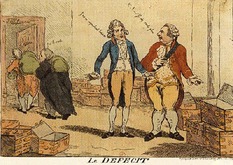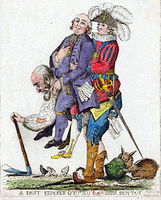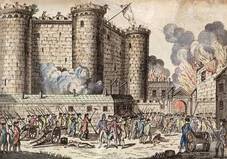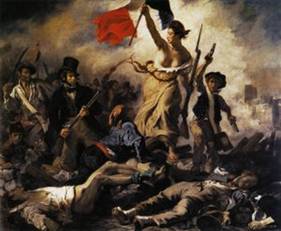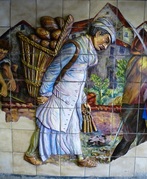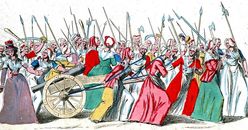The Causes of the French Revolution
By: Jazmin Haque and Karen Angeles
Financial Collapse and Discontent With the Monarchy
|
Louis XVI married Marie Antoinette, an Austrian duchess, at the age of 15, forming a political alliance with the Austrian Empire. In 1774, Prince Louis the XVI ascended the throne after the death of his grandfather Louis XV, aware that he did not know how to efficiently run the country. Their failure to produce a male heir permanently damaged the image of the young monarchs. Louis’ impotence was seen as “lack of bravado as a king” and Marie’s failure to conceive an heir until the 7th year of their marriage was added to the list of debts she owned to her people.
King Louis' XV defeat at the Seven Years War with Britain over territory in North America left France bankrupt, and thus left little means to provide for its growing population. In the wake of the American Revolution, King Louis XVI decided to fund the Americans with 200 million livre, which was “enough to house and feed seven million French citizens for a year.” The debt that was left by this investment was so large that the government was unable to repay it, and it marked the start of the worst of the financial collapse of France. Marie Antoinette and her extravagant expenses also caused anger in the people of France. She lavished money on fashion, jewels, gambling, and feasts, while her people were starving, giving her the name of Madame Deficit. In a failed attempt for economic reform, Louis XVI decided to impose a new tax system. His tax reforms only increased the burden on the majority of France; the poor were heavily taxed while the aristocracy paid almost nothing. Jacques Necker was placed as finance minister in 1777, and his ideas that it was the government’s duty to make sure there was enoughgrain for the population soon increased his popularity among the people. Unfortunately, his proposals to restrict the power of the Ancien Regime made him unpopular with the king’s ministers, who fired later fired him. On May 5, 1789 Louis XVI called a meeting for the Estates-General for the first time since 1614. The first two states represented the clergy and the nobility, who made up about 3% of the French population, while the third estate, which had one third of the representatives, represented 97% of the population. When Robespierre and other representatives of the 3rd Estate demanded that the clergy and the nobility also pay taxes, the First and Second Estates locked the representatives from the meeting. While all 3 Estates had the power to vote, the first two estates locked out the Third estate, in effect giving the people no say in daily affairs. Both the nobles and the clergy had been exempted from paying direct taxes and the majority of them had been paid by the Third Estate. Other inequalities that were present were feudal dues that were “out of date”. In addition, the peasants were forced to pay dues to the church. All of these inequalities had caused for major discontent within the social classes which is why the French Revolution is known as a “class war”. The members of the Third Estate decided to meet at a nearby tennis court, and vowed they would meet until they drafted a constitution. In what became the Tennis Court Oath, the Third Estate broke away from the Estates-General on June 17, 1798, and established itself as the National Assembly. On July 14th, 1789, Bastille was sacked and destroyed by a group of French people united under the tricolor flag trying to obtain gunpowder. Governor Bernard de Launay attempted to stop the mob, but was dragged through Paris until he was beheaded. The Storming of Bastille represented the defeat of tyranny, which was symbolized by the tearing down of Bastille “brick by feudal brick.” The National Assembly soon passed the Declaration of the Rights of Men, in which class distinctions were abolished with the goal to render men equal. |
|
Enlightenment Ideas and Outside Influence
|
Enlightenment Ideas had caused for the French Revolution in an indirect way. These ideas allowed for the realization and power of what the rights of man were and how they should not be taken away by any form of government. Rousseau’s idea that self-interest drives people to work together with minimal to no help or direction of the government had given the French the ideas of limited government rather than an absolute monarchy. John Locke’s ideas of how “government with the consent of the governed” had allowed for debates about how government should interact with the people and how the people should interact with the government. Lastly, John Locke had presented what a person’s “Natural Rights” had been. These included the right to life, liberty, and property. All of these Enlightenment ideas had driven the people of France to revolt and understand what they wanted to reform within their government. These ideas were used as a "blueprint" for what the people wanted in a new society.
|
Environmental Changes and Food Shortages
|
A series of bad harvests and deregulation led to the rise in the price of flour, and subsequently of the main food item of the French people: bread. To make things worse, France was hit by the coldest winter in several decades. By the summer of 1778, a serious food shortage hit the people. Because the coast of a loaf of bread was so high, chaos and riots broke out. Bakeries were robbed and people were lynched in order to obtain bread.
Robespierre wrote in a letter of complaint to the King: The people's resentment towards the King increased rapidly as he did not do anything effective to stop the rising prices of flour and bread. Marie Antoinette and the nobility enjoyed lavish feasts while the people on the streets were starving.
Travels in France (1792) - Arthur Young To Montauban. The poor people seem poor indeed; the children terribly ragged, - if possible, worse clad than if with no clothes at all; as to shoes and stockings, they are luxuries. A beautiful girl of six or seven years playing with a stick, and smiling under such a bundle of rags as made my heart ache to see her. They did not beg, and when I gave them anything seemed more surprised than obliged. One third of what I have seen of this province seems uncultivated, and nearly all of it in misery. What have kings, and ministers, and parliaments, and states to answer for their prejudices, seeing millions of hands that would be industrious idle and starving through the execrable maxims of despotism, or the equally detestable prejudices of a feudal nobility. Sleep at the Lion d'Or, at Montauban, an abominable hole. This document (letter) shows how the nobility and the government allowed for the people of the lower classes to starve and live without natural rights while the elite lived "lavishly". These conditions had led to discontent between the classes and had been a cause to the French Revolution. On October 5th, thousands of women gathered to march to Versailles to protest the high price of bread. When they reached the palace, King Louis XVI agreed to sign the Declaration of the Rights of Men in an attempt to appease the mob. The mob, angered by Louis' hesitation to move to Paris, stormed into Versailles calling for the death of the Queen. After a violent fight with the guard, more troops cleared the palace from the mob.The Marquis De Lafayette convinced the King and Queen to address the crowd now gathered outside the palace. Louis agreed to return to Paris with Marie Antoinette and his children. |
|
Works Cited
"The French Revolution (1789–1799)."
SparkNotes. SparkNotes, n.d. Web. 28 Mar. 2013.
The French Revolution. Dir. Dough Shults. The History Channel, 2005. Documentary.
"French Revolution." Infoplease. Infoplease, n.d. Web. 28 Mar. 2013.
"French Revolution." Wikipedia. Wikimedia Foundation, n.d. Web. 28 Mar. 2013.
"Women's March on Versailles." Wikipedia. Wikimedia Foundation, 29 Mar. 2013. Web. 29 Mar. 2013. "French Revolution." French Revolution. N.p., n.d. Web. 29 Mar. 2013. <http://www.talktalk.co.uk/reference/encyclopaedia/hutchinson/m0003820.html>.
"French Revolution." Wikipedia. Wikimedia Foundation, 30 Mar. 2013. Web. 29 Mar. 2013. <http://en.wikipedia.org/wiki/French_Revolution>.
Pace, Tom. "Which Enlightenment Ideals Affected the French Revolution?" EHow. Demand Media, 14 June 2011. Web. 29 Mar. 2013. <http://www.ehow.com/info_8589907_enlightenment-ideals-affected-french-revolution.html>.
PBS. PBS, n.d. Web. 29 Mar. 2013. <http://www.pbs.org/marieantoinette/timeline/reign.html>.
"Reign of Terror." Wikipedia. Wikimedia Foundation, 29 Mar. 2013. Web. 29 Mar. 2013. <http://en.wikipedia.org/wiki/Reign_of_Terror>.
The French Revolution. Dir. Dough Shults. The History Channel, 2005. Documentary.
"French Revolution." Infoplease. Infoplease, n.d. Web. 28 Mar. 2013.
"French Revolution." Wikipedia. Wikimedia Foundation, n.d. Web. 28 Mar. 2013.
"Women's March on Versailles." Wikipedia. Wikimedia Foundation, 29 Mar. 2013. Web. 29 Mar. 2013. "French Revolution." French Revolution. N.p., n.d. Web. 29 Mar. 2013. <http://www.talktalk.co.uk/reference/encyclopaedia/hutchinson/m0003820.html>.
"French Revolution." Wikipedia. Wikimedia Foundation, 30 Mar. 2013. Web. 29 Mar. 2013. <http://en.wikipedia.org/wiki/French_Revolution>.
Pace, Tom. "Which Enlightenment Ideals Affected the French Revolution?" EHow. Demand Media, 14 June 2011. Web. 29 Mar. 2013. <http://www.ehow.com/info_8589907_enlightenment-ideals-affected-french-revolution.html>.
PBS. PBS, n.d. Web. 29 Mar. 2013. <http://www.pbs.org/marieantoinette/timeline/reign.html>.
"Reign of Terror." Wikipedia. Wikimedia Foundation, 29 Mar. 2013. Web. 29 Mar. 2013. <http://en.wikipedia.org/wiki/Reign_of_Terror>.
